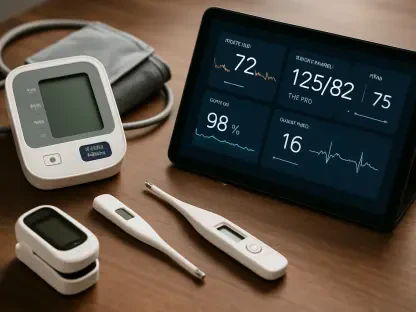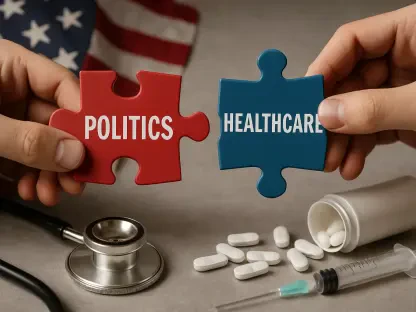In today’s healthcare environment, the integration of technology and medicine represents not just a possibility, but a necessity. James Maitland, an expert in robotics and IoT applications within the medical field, understands the importance of leveraging technological advancements to propel healthcare forward. His insights into purposeful leadership and strategic healthcare transformations offer a glimpse into the challenges and innovative solutions shaping the industry.
What does purposeful leadership in healthcare mean to you?
Purposeful leadership in healthcare involves setting clear objectives that go beyond immediate medical needs. It’s about adopting a vision that incorporates patient care and operational efficiency, and harnessing effective strategies to achieve these goals. Leaders in healthcare need to inspire teams across multifaceted sectors, ensuring that new technologies are seamlessly integrated while maintaining the core mission of improving patient outcomes.
Why is there an urgent need to transform healthcare management in today’s landscape?
The healthcare landscape has evolved, demanding more than clinical excellence; it requires comprehensive business strategies. This shift stems from the increasing complexity of healthcare systems, which now encompass elements such as financial management, regulatory policies, and strategic expansion. Healthcare providers are tasked with navigating these complex waters to ensure long-term sustainability and growth, necessitating a transformation in management approaches.
Why is it essential for healthcare leaders to have skills beyond clinical excellence?
Healthcare leaders must possess skills that extend beyond clinical expertise to effectively manage operations and regulatory challenges. These include financial acumen, strategic planning, and human resources management. Such skills contribute to the resilience and expansion of healthcare organizations, enabling them to deliver quality care while also responding to dynamic environmental and policy changes.
What challenges do healthcare professionals face when transitioning from clinical roles to business management?
The transition can be daunting, primarily because clinical training doesn’t typically include business management components. Healthcare professionals may lack essential skills in financial planning, strategic decision-making, and leadership, which are crucial for successful management. This skills gap can hinder their ability to lead healthcare organizations effectively in an increasingly competitive environment.
How does the lack of strong leadership impact healthcare facilities, especially small and medium-sized enterprises (SMEs)?
Inadequate leadership can lead to inefficiencies, poor financial management, and lack of strategic direction, especially in SMEs, where resources are already limited. This impact is magnified in low- and middle-income countries, where the healthcare infrastructure is fragile, ultimately affecting the consistency and quality of care provided to patients.
Can you tell us more about the Healthcare Management Program (HMP)?
The HMP is designed to bridge the gap between clinical expertise and business management, offering healthcare professionals the practical tools to lead effectively. Its curriculum covers essential areas such as financial management and strategic planning, with real-world applicability, empowering participants to immediately apply learned concepts to their organizations.
What are some of the key components of the HMP curriculum?
The curriculum is structured to provide a holistic education in essential healthcare management areas, including strategic planning, financial management, human resources, and quality assurance. Delivered through a mix of online and in-person sessions, the program ensures participants gain both theoretical knowledge and practical skills, fostering immediate impact in their professional environments.
How have alumni of the HMP program transformed their organizations?
Alumni from the program have demonstrated tangible improvements in their organizations, implementing strategic reforms and enhancing operational efficiency. Their ability to apply financial and operational strategies learned through the course has led to better service delivery and expanded access to care, establishing their organizations as models of innovation and excellence.
What role does the HFN Women’s Forum play in healthcare leadership development?
The HFN Women’s Forum supports healthcare leadership development by focusing on the empowerment of female healthcare professionals. It addresses unique challenges women face in leadership roles, providing mentorship and resources to foster growth and inspire innovation within the healthcare sector. Through this initiative, a diverse pipeline of future female leaders is cultivated, equipped to drive substantial changes in healthcare.
Can you describe the impact of initiatives like the HFN Women’s Forum Pitchathon?
Initiatives such as the Pitchathon play a significant role by offering a platform for young female entrepreneurs to showcase innovative solutions. These platforms provide mentorship, resources, and networking opportunities, fostering entrepreneurship and encouraging women to develop impactful healthcare solutions that address pressing problems within the industry.
How important is leadership development across the entire healthcare ecosystem, not just among facility managers and clinical staff?
Leadership development is crucial not only for those directly involved in patient care but also for policymakers and regulators. These individuals shape the framework within which healthcare operates and must possess strategic leadership skills to create effective systems and policies that support healthcare organizations to adapt and thrive.
How do frontline healthcare workers fit into the broader healthcare system, and why is leadership important for them too?
Frontline healthcare workers are integral to the healthcare system, often serving as the first point of contact for patients. Their leadership skills, strategic awareness, and capacity to collect and interpret data can influence policy decisions, funding priorities, and national health metrics. Ensuring they have leadership capabilities is crucial for creating a larger, cohesive healthcare network.
What are the ongoing efforts and initiatives to support continuous leadership development in healthcare?
Efforts to support leadership development in healthcare involve continuous education, mentorship programs, and capacity-building initiatives. Diverse stakeholders can contribute by sponsoring educational opportunities, facilitating workshops, and providing platforms for exchange and development, ensuring leaders remain adept at navigating the evolving healthcare landscape.
What is your forecast for healthcare leadership development?
I foresee a continued emphasis on inclusive leadership strategies that integrate both clinical and operational knowledge. Future leaders will need to be adaptable, embracing technological advancements and fostering sustainable healthcare models. There’s a growing recognition of leadership as a force for transformation, and this will drive investment and innovation in training programs, ultimately fortifying the healthcare system’s ability to meet global challenges.









